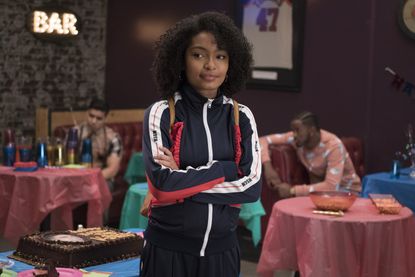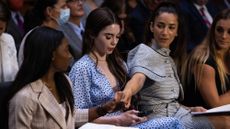Why Grown-ish has been 2018's best new sitcom
Rather than putting young people under a microscope, it's letting the kids do the looking


When the season finale of the Freeform dramedy Grown-ish airs this Wednesday night, the show's fans can only hope that it will feature a moment as poignant and true as the opening sequence from last week's episode "Crew Love." Over a montage of all the major characters dancing and drinking in a club, the protagonist, college freshman Zoey Johnson (played by Yara Shahidi) talked about how her generation is notorious for spilling their guts on social media, but added that, ironically, kids today suck at sharing their emotions with each other face to face.
During Zoey's monologue, Drake's "Doing It Wrong" played on the soundtrack, because Drake, she said, "talks about our feelings for us." Then his lyrics appeared on the screen, as a punctuation: "We live in a generation of not being in love / And not being together / But we sure make it feel like we're together."
Why does it matter that Grown-ish understands the larger meaning of Drake? Because that's a point-of-view most other series don't have. And in this crowded TV landscape, having a perspective matters.
Subscribe to The Week
Escape your echo chamber. Get the facts behind the news, plus analysis from multiple perspectives.

Sign up for The Week's Free Newsletters
From our morning news briefing to a weekly Good News Newsletter, get the best of The Week delivered directly to your inbox.
From our morning news briefing to a weekly Good News Newsletter, get the best of The Week delivered directly to your inbox.
Back in 2016, I wrote an essay for The Week called "Why TV loves to hate millennials," in which I noted that the television industry thrives on young talent, and needs young viewers, concluding, "It's great that the media wants to engage with a newer audience, because that's how our entertainment stays fresh. But it'd feel even fresher if we could hear these youngsters' actual voices, and not what their skeptical elders imagine them to be."
Like several shows on Freeform (and its predecessor, ABC Family) Grown-ish appears to have a mandate to give the younger generation a voice. That shouldn't be too surprising, given that it's a spinoff from Black-ish, an ABC sitcom that for the past four years has offered creator Kenya Barris' insider's take on what it's like to be a successful black professional, raising kids in a predominately white, upper-middle-class neighborhood.
Black-ish though ultimately defaults to the experiences and impressions of the middle-aged, which means that it's sometimes skeptical about millennials and "Generation Z." Grown-ish, on the other hand, recently aired an episode about college "safe spaces" — something much-mocked by leftist comedians and right-wing op-ed writers alike — and offered a reasonable explanation of how they can be valuable to minorities on campus, along with some sharp criticism of whether they're fairly and equitably established. Zoey's roommate Ana (Francia Raisa) is a conservative Republican, who supported the idea of enclaves for the like-minded, but got upset when her friends didn't think her political allies deserve the same sanctuary from negation as students of similar ethnic backgrounds or sexualities.
When Grown-ish was introduced via Black-ish back in the spring of 2017 — in what the TV industry calls a "backdoor pilot" — the episode gave the impression that the spin-off would primarily concern racial and class identity, while spoofing the politically charged atmosphere of the modern college campus. The first official Grown-ish episode initially reinforced that perception. In addition to Zoey and Ana, the pilot introduced black militant Aaron (Trevor Jackson), Jewish bisexual Nomi (Emily Arlook), inner city Los Angeles track star twins Jazlyn and Skylar (Chloe and Halle Bailey), entrepreneurial Indian-American drug dealer Vivek (Jordan Buhat), and the effortlessly cool, label-defying Luca (Luka Sabbat).
But two Grown-ish elements in particular have been pleasantly surprising. One is how much better-rounded Zoey is as a character here than she ever was on Black-ish. Shahidi's main purpose on the original series was to play an inscrutable, fashionable teen, beyond her parents' understanding. Now that she's narrating her own life though, Zoey is revealing her weaknesses and insecurities (often in direct address to the camera), and Shahidi has been delivering a performance both comic and touching.
The second surprising element is how frank Grown-ish has been about the realities of campus life: from casual sex to popping pills. There's very little moralizing in this series. If characters sleep around or take Adderall to help them study, the consequences are minimal. If Zoey uses her latest political cause as an excuse to change her wardrobe and post Instagram selfies, the show recognizes the humor in that without belittling her sincerity.
This is where I should note, in the interest of context, that I'm a 47-year-old white male who's lived pretty much his entire life in the American southeast. So I wouldn't presume to make any definitive assessment of Grown-ish's depiction of what it's like to be a black female college student in California. My admittedly very meager credentials are that my wife's a university professor, and our two kids are teenagers, which means I know a little — but just a little — about what young folks go through in 2018.
But I've also watched a lot of TV and have seen a lot of movies, which perhaps qualifies me to point out what feels true, versus what comes off as lazy, short-sighted clichés. And for me, Grown-ish has felt refreshingly up-to-date and non-condescending. The writers (many of whom have little to no other credits prior to working on Grown-ish) seem to be fighting for some sense of realism in their portrayal of how people in their late teens use social media, and of the nuanced ways they think about morality and justice. These characters are frequently funny, but rarely shrill, or ridiculous.
Again, this isn't terribly unusual for a Freeform/ABC Family series. The Fosters, Switched at Birth, The Bold Type ... These shows have all taken the passions of contemporary youth seriously, and presented them with real complexity, taking into account the pros and cons of different characters' points of view. (Grown-ish's terrific time-slot companion Alone Together is also very "now," though its lead couple's trendy obsessions are played more for self-aware laughs.)
Grown-ish is far from perfect. From a narrative perspective, it could stand to push Zoey and her friends a lot harder, giving them problems that linger more than an episode or two. And unlike some shows with predominately minority casts — like Black-ish, Black Lightning, Jane the Virgin, Superstore, The Good Place, and Brooklyn Nine-Nine — Grown-ish has a tendency to define its characters first and foremost by their "type," rather than letting their individual pasts and personalities drive the choices they make.
But that's a common "first season" kind of problem. Sitcoms in particular — even ones with dramatic elements — tend to start broad, and then refine, as the actors and the writers settle into the world they're creating together.
Grown-ish has already been renewed for a second season, so it'll have a chance to nurture what's already been planted. And there's plenty of fertile ground here, provided that the writers remember what sets their show apart. Rather than putting young people under a microscope, it's letting the kids do the looking.
And that's made for the most promising debut on TV so far this year.
Create an account with the same email registered to your subscription to unlock access.
Sign up for Today's Best Articles in your inbox
A free daily email with the biggest news stories of the day – and the best features from TheWeek.com
Noel Murray is a freelance writer, living in Arkansas with his wife and two kids. He was one of the co-founders of the late, lamented movie/culture website The Dissolve, and his articles about film, TV, music, and comics currently appear regularly in The A.V. Club, Rolling Stone, Vulture, The Los Angeles Times, and The New York Times.
-
 'Voters know Biden and Trump all too well'
'Voters know Biden and Trump all too well'Instant Opinion Opinion, comment and editorials of the day
By Harold Maass, The Week US Published
-
 Is the Gaza war tearing US university campuses apart?
Is the Gaza war tearing US university campuses apart?Today's Big Question Protests at Columbia University, other institutions, pit free speech against student safety
By Joel Mathis, The Week US Published
-
 DOJ settles with Nassar victims for $138M
DOJ settles with Nassar victims for $138MSpeed Read The settlement includes 139 sexual abuse victims of the former USA Gymnastics doctor
By Justin Klawans, The Week US Published
-
 Walter Isaacson's 'Elon Musk' can 'scarcely contain its subject'
Walter Isaacson's 'Elon Musk' can 'scarcely contain its subject'The latest biography on the elusive tech mogul is causing a stir among critics
By Theara Coleman Published
-
 Welcome to the new TheWeek.com!
Welcome to the new TheWeek.com!The Explainer Please allow us to reintroduce ourselves
By Jeva Lange Published
-
 The Oscars finale was a heartless disaster
The Oscars finale was a heartless disasterThe Explainer A calculated attempt at emotional manipulation goes very wrong
By Jeva Lange Last updated
-
 Most awkward awards show ever?
Most awkward awards show ever?The Explainer The best, worst, and most shocking moments from a chaotic Golden Globes
By Brendan Morrow Published
-
 The possible silver lining to the Warner Bros. deal
The possible silver lining to the Warner Bros. dealThe Explainer Could what's terrible for theaters be good for creators?
By Jeva Lange Last updated
-
 Jeffrey Wright is the new 'narrator voice'
Jeffrey Wright is the new 'narrator voice'The Explainer Move over, Sam Elliott and Morgan Freeman
By Jeva Lange Published
-
 This week's literary events are the biggest award shows of 2020
This week's literary events are the biggest award shows of 2020feature So long, Oscar. Hello, Booker.
By Jeva Lange Published
-
 What She Dies Tomorrow can teach us about our unshakable obsession with mortality
What She Dies Tomorrow can teach us about our unshakable obsession with mortalityThe Explainer This film isn't about the pandemic. But it can help viewers confront their fears about death.
By Jeva Lange Published